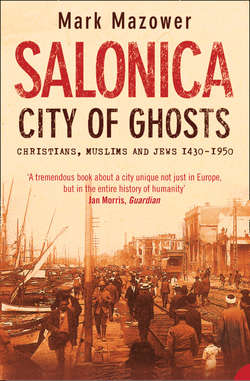Читать книгу Salonica, City of Ghosts: Christians, Muslims and Jews - Mark Mazower - Страница 11
Invaders
Оглавление‘Guarded by God, greatly surpassing every city in Thrace and in all of Illyricum as to variety of wealth’, the city was superbly protected by its towering walls, by its fortress perched commandingly above the bay and even by the spit of land which guarded the entrance to the gulf itself. It needed all the divine protection it could get, however, for through the centuries its riches and location seemed to attract one invader after another. In the sea raid of 904 an assault by Sudanese, Arab and Egyptian soldiers, led by Byzantine converts to Islam, left the city strewn with corpses and thousands of its inhabitants were sold into slavery. But that remained an isolated event, for Macedonia was far from the centre of the long-running Byzantine-Arab land war, and in eastern Europe – unlike in Syria and Anatolia – the men of Christ had almost a thousand more years to proselytize before confronting a serious rival in Islam.
Infinitely more important in the long run than the booty-hunters were the nomadic tribes who found Salonica on their path as they migrated from the central Asian steppes to the verdant lands of Europe. Some passed through before veering off to the north and settling elsewhere. But starting in the mid-sixth century, Byzantine military experts became aware of a new threat – the Slavs. According to the court historian, Procopius, they lived in miserable huts, were often on the move, and went to war mostly on foot and armed only with small shields and javelins.6 Yet despite their poverty and their crude weaponry the Slavs had numbers on their side, and quickly became a serious threat to Byzantine rule. In the late sixth century, they reached the walls of Salonica for the first time, and a huge army gathered on the plains outside the walls.7 Only Saint Dimitrios saved the day: thanks to his inspiration, the defenders suspended curtains below the ramparts to blunt the shock of the missiles hitting the walls, while armed sorties frightened the attackers into retreat. Again and again the Slavs laid siege to the city; each time, Saint Dimitrios, it was said, kept them at bay in a series of miracles which were collected, written down, and re-told over centuries.
The Slav tribes did not disappear. They settled as farmers and traders in villages across Greece and down into the Peloponnese, and the fundamental ethnographic balance between Salonica and its hinterland over the next fourteen hundred years was henceforth established: a predominantly Slavic peasantry cultivated the soil and was kept under the political and economic control of non-Slav elites based in the city.8 But frontiers are places of interaction, and few frontiers were more permeable or symbiotic than that between the Slavs and the Greeks. The former trickled into Salonica, drawn by the seductive power of a Hellenic education and the upward mobility this bought. Only nineteenth-century romantic nationalism turned the permeable boundaries between Slav and Greek into rigidly patrolled national cages.
Moreover, the city did not only take in the Slavs, but it reached out to them too, and converted them, through the Church, into members of its own civilization. It was two brothers from Salonica, Constantine [better known to posterity by his later name, Kyrill] and Methodius, themselves possibly of Slavic descent, who drew up a new alphabet, adapted from Greek, translated the Christian liturgy into Slavic and spread Christ’s message across eastern Europe. The extent of their success was matched only by that with which others were spreading the word of Mohammed in the Middle East. The seeds of their mission were planted in Dalmatia, Hungary, Moravia and Poland; by the end of the ninth century the pagan Bulgars too had been converted. As a result, a version of the Cyrillic alphabet first devised by these two sons of a Byzantine officer from Salonica is taught today in schools from the Adriatic to Siberia.
